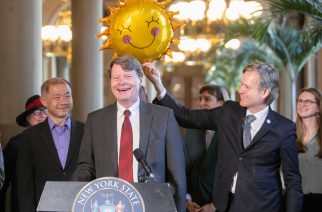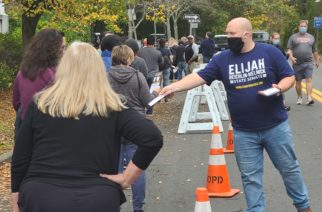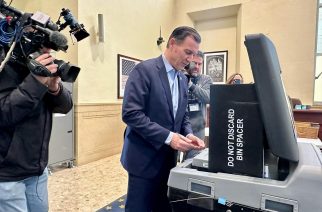
New York City mayoral candidate Eric Adams speaks to the congregants of the First Baptist Church in Corona on Sunday. Adams is the current frontrunner in the Democratic primary for New York City mayor.
Early voting has started for the New York City mayoral election and the Democratic primary will be held Tuesday June 22. The General Election will be held Tuesday, November 2.
There are currently a total of 16 Democrats and 3 Republicans running for mayor. Based on recent polling, the top six Democratic candidates currently are: Eric Adams, Andrew Yang, Scott Stringer, Kathyrn Garcia, Dianne Morales, Shaun Donovan and Maya Wiley.
For the first time, New Yorkers will be using a ranked choice system to list up to five candidates in order of preference. The New York City Board of Elections website provides up-to-date information on polling locations, wait times at early voting spots, and personalized ballots based on zip code.
Eric Adams — the frontrunner in a recent NY1/Ipsos poll — was a former police captain, and he served in the New York State Senate for seven years from 2007-2013. He was elected Brooklyn Borough President in 2013. Adams’ key positions include more focus on helping small businesses around the city, desegregating the school system and expanding choices for school, and finally having civilian workers take over non-crime fighting jobs.
Adams wants the city to offer doulas to all first time mothers. He has also proposed ending summer vacation and starting education early. He does not support reducing the NYPD budget and proposed to restore the anti crime unit with a new unit focused on gun control. On the topic of transportation, Adams’ proposal is to give commuters free transfers for subway stations within a half mile of each other, even if they are not connected transfers. Under his administration, he wants to improve access and mobility by reopening closed subway entrances. Furthermore, Adams has suggested that a way to combat the housing and homelessness issue is to convert hotels to single room occupancy housing (SROs) that will be available to the homeless.
One of the most concerning issues is about the environment. Climate change has posed a threat and is challenging to combat. Most of the candidates call for expanding parks. More specifically, Adams proposes to replace urban highways with more pedestrian park space.
Andrew Yang, who ran for president of the United States in 2020 is another top candidate for mayor. He has founded Manhattan Prep and Ventures for America. One of his main priorities if elected is to give New Yorkers living in extreme poverty an average of $2,000 and emphasized small business recovery following the pandemic.

On the issue of policing and criminal justice, Yang supports the call to temporarily increase the number of officers on streets and areas of high crime rates around the subways. To combat extreme poverty in NYC, Yang advocates for a Universal Basic Income (UBI), which would essentially give 500,000 of the lowest income New Yorkers an average of $2,000 a year.
As the stress of the pandemic continues to affect the education of students all around NYC, Yang’s calls to keep the Specialized High School Admissions Test (SHSAT) and have two specialized high schools in each borough.
Former New York City Sanitation Commissioner Kathryn Garcia has slowly gained traction in the mayor’s race, putting her alongside Andrew Yang and Eric Adams as the three front runners of the race. Garcia proposes to build new high schools in South Brooklyn, central Queens, and South Bronx. She also wants to ensure that public schools are available to all families regardless of zip code. In addition, she calls for the removal of police from schools and wants to focus on providing mental health support for students that have been negatively affected by COVID-19. On the topic of policing and criminal justice, Garcia along with many other candidates do not support “Defund the Police.” Instead, she wants to raise the minimum age to become a police officer from 21 to 25. In cases of misconduct, Garcia wants to deduct officer pay.
Garcia also has detailed plans on transportation issues. She wants to add 250 miles of protected bike lanes and reassign 25% of the city’s car space for pedestrians, which would help the city create more crosswalks and greeneries. She also promises to create 50,000 new affordable housing units in addition to opening new “drop-in centers” for the homeless to have access to support services. To make this happen, she calls for buying empty or underused private properties to combat the housing and homelessness crisis. Furthermore, Garcia wants to focus the city’s outreach to Black mothers and wants the state to create a SUNY Midwifery scholarship program.
Like Garcia, City Comptroller and Manhattan Borough President Scott Stringer also wants to provide more support for students struggling with mental health by establishing a mental health continuum, expansion of social workers and other mental health professionals, and to create “Fastrack Benefits” to help families connect to services of their child’s school. Additionally, he also wants to remove armed NYPD officers from schools.
Unlike Adams who does not support NYPD budget cuts, Stringer proposes to reduce the NYPD budget over a course of four years and calls for programs designed to prevent gun crime in the youth.
“Not every incident in a community requires a badge and a gun,” Stringer said. He wants to redesign NYC’s first-response system and supports the idea that police officers should not be first responders to mental health, homelessness, and other non-crime calls. Furthermore, Stringer wants to construct and renovate health care facilities in low income neighborhoods.
Stringer, along with other candidates have the goal of providing New Yorkers a more safe, efficient, and environmentally friendly transportation system. Stringer wants to provide more bikeways and scale back on highway infrastructure and instead, convert the road space into green space.
On the subject of housing and homelessness, Stringer plans on converting city-owned vacant land into affordable housing and requiring new buildings to set aside 25 percent of the apartments for affordable housing.
Former New York City public school teacher and non-profit executive Dianne Morales has labeled herself as a progressive candidate in the mayoral race. One of her main differences compared to a majority of other candidates is that she supports cutting NYPD’s budget by more than half — at least $3 billion and plans on reallocating the money into services for New Yorkers such as social programs.
“Every child is gifted and talented.” – Dianne Morales. Compared to Yang who supports keeping the SHSAT and adding more specialized schools, Morales wants to desegregate schools by removing all screening, so that middle and high schools could not use an exam or grades to grant admission. She also agrees that police should be removed in schools and wants to reallocate $450 million to expand on mental health services, student support positions and other services.
Morales plans on expanding busways and express bus lanes and wants to work towards free public transportation, including a Fair Fares program that would provide all NYC students and low-income New Yorkers free transportation and make Citibikes free for New York City residents.
Within the first 100 days, Morales promises to convert hotels into housing to address the homelessness issue in the city. Under her administration, Morales wants to create more green jobs such as creating a workforce pipeline into urban gardening, sustainability, and renewable energy. Moreover, she wants to provide preventative primary care across the city by creating community health clinics.
Previous member of former President Obama’s cabinet, Shaun Donovan worked as the housing secretary and budget director during Obama’s presidency. Under Donovan’s administration, he proposes to create 30,000 affordable housing units per year and “create an improved system of emergency rental assistance to help people stay housed when facing economic setbacks.”
Like many other candidates, Donovan also supports the removal of police from schools and wants to invest in programs and hire trained response coordinators in child development and de-escalation. In addition, he wants to hire more teachers and school leaders of color over the next 10 years. In his proposal for policing and criminal justice, Donovan wants to redirect the roles of police officers in situations like mental health crisis and school safety and replace them with professionals to address those situations. Moreover, Donovan wants to stop crackdowns on immigrant New Yorkers and protect them from federal immigration enforcement.
Donovan also proposes to launch a Bus Rapid Transit (BRT) network for faster transportation throughout the city. His goal is to also expand bicycle infrastructure to create better connected and protected bike lanes.
Donovan along with Yang and Adams have proposed giving money to New Yorkers in need. Donovan pitched a plan to give $1,000 into a savings account for every child in the city and $2,000 annually depending on family income.
Lawyer and civil rights activist, and former counsel to Mayor Bill de Blasio, Maya Wiley has recently gained a lot of momentum in the mayoral race. The recent endorsement from US Rep. Alexandria Ocasio-Cortez has helped with Wiley’s campaign. Wiley wants to reshape and defund the NYPD, promising to cut $1 billion from them. She proposes that the money would be reallocated to help develop strategies in communities with high rates of gun violence, and other alternatives to policing. Like many other candidates, Wiley also wants to redirect the roles of the NYPD, having mental health professionals handle mental health emergency calls rather than the NYPD.
Wiley, along with other candidates, wants to reallocate the budget for school policing from NYPD to expand on mental health services instead. In addition, Wiley wants to invest in hiring a full time nurse in NYC public schools and calls for eliminating the use of separate gifted and talented classes.
Wiley wants to create more protected bike lanes and bus lanes to help speed up transportation. She wants to remove the NYPD from traffic enforcement. Her plan to tackle homelessness and housing problems in the city is to create a direct rent relief program and give the stimulus money for New Yorkers facing eviction and possible homelessness. Furthermore, she wants to expand the City’s Rental Assistance program so it becomes an effective tool to ensure affordability long term.
Like some of the other other candidates, Wiley wants to compensate women, in particular women of color who have been driven from the workforce during the pandemic, $5,000 grants to 100,000 of the city’s lowest-income residents. Moreover, she wants to reallocate some of the police budget and proposes to set up more community care centers that would provide child and elder care around the city using the redirected NYPD budget. These community centers would also be used to host other services.









